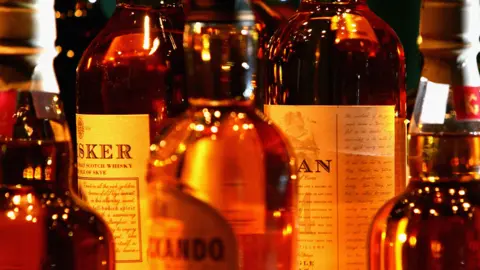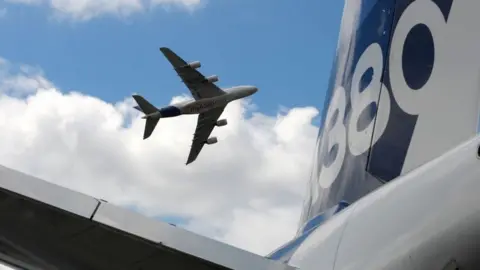Single malt Scotch whisky targeted by United States tariffs
 Getty Images
Getty ImagesSingle malt Scotch whisky exported to the United States is to face a tariff of 25% from 18 October.
The new duty is part of a raft of measures being imposed by the US in retaliation against EU subsidies given to aircraft maker Airbus.
Other goods being targeted include cashmere sweaters, dairy products, pork, books and some machinery.
Scotch exports to the US last year were worth $1.3bn (£1bn), with single malts accounting for a large share of that.
The US was given the go-ahead to impose tariffs on $7.5bn (£6.1bn) of goods it imports from the EU following a World Trade Organisation (WTO) ruling on Wednesday.
It is the latest chapter in a 15-year battle between the US and the EU over illegal subsidies for planemakers Airbus and rival Boeing.
 Getty Images
Getty ImagesThe ruling by the WTO will mean tariffs on EU goods ranging from aircraft to agricultural products.
Brussels has threatened to retaliate similarly against US goods.
'Serious situation'
Karen Betts, chief executive of the Scotch Whisky Association, said it was a blow to the Scotch whisky sector.
"This is a serious situation for the industry," she said.
"We heard overnight that a 25% import tariff will be imposed on all single malts into the United States and also all Scotch whisky liqueurs, and that's from a position of zero.
"We've had a zero tariff on imports to the United States for the past 25 years, so this is quite a hike."
The Scotch whisky industry directly employs about 11,000 people in Scotland, and many more indirectly through its supply chain.
More than 7,000 of the jobs are in rural areas across the country.
A spokesman for the UK's Department for International Trade said: "Resorting to tariffs is not in the interests of the UK, EU or US.
"The UK is working closely with the US, EU and European partners to support a negotiated settlement to the Airbus and Boeing disputes.
"The UK, through the EU, is seeking confirmation from the WTO that we have complied fully with WTO rulings regarding support to Airbus, and should not be subject to tariffs."
How did this row start?
 Getty Images
Getty ImagesThe US first filed the case in 2004, arguing that cheap European loans for Airbus amounted to illegal state subsidies.
The WTO decided in favour of the US, which subsequently complained that the EU and certain member countries were not in compliance with the decision, prompting years of further wrangling.
The US had sought to impose tariffs on about $11bn in goods. Though the WTO cut that figure to $7.5bn, Wednesday's decision still marks the largest penalty of its kind in the organisation's history.
The WTO's dispute settlement body must formally adopt the ruling but is not expected to overturn the decision.
